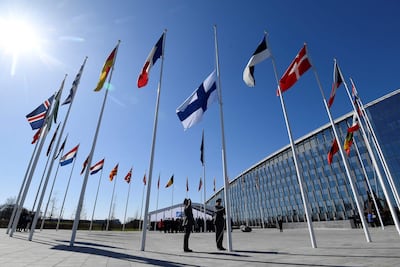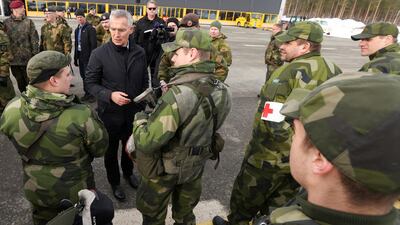Sweden says it has met all of Turkey’s requirements to join Nato after a tougher counter-terrorism law came into force on Thursday.
The new law makes it a crime to take part in a terrorist group, finance its activities, recruit others or travel abroad to support it.
Turkey had demanded a crackdown on Kurdish militants before it would back Sweden and Finland’s accession to Nato.
Finland formally joined Nato in April but Sweden is still waiting for approval from two of 31 allies, Turkey and Hungary.
Nato chief Jens Stoltenberg said he would visit Ankara “in the near future” to persuade newly re-elected Turkish President Recep Tayyip Erdogan to back Sweden’s entry.
Speaking at a Nato meeting in Oslo, Mr Stoltenberg said he would highlight to Mr Erdogan the Swedish laws taking effect on Thursday.
“They demonstrate that Sweden is now taking new steps to step up the fight against terrorism, including for instance the PKK,” Mr Stoltenberg said, referring to the Kurdish group at the centre of Turkey’s grievances.
“The fact that Sweden has delivered on those commitments just highlights the importance of making sure that Sweden becomes an ally as soon as possible.”

Sweden’s Foreign Minister Tobias Billstrom said he would tell allies his government “has fulfilled all the commitments” to which it agreed in three-way talks with Finland and Turkey at last year’s Nato summit in Madrid.
“This was never a sprint, it’s a marathon and we now see the end of it,” he said.
Some diplomats have expressed hope that Sweden could be a Nato member by the time of a leaders’ summit in Lithuania next month. Sweden already attends Nato meetings and takes part in drills.
Sweden will meet Turkey and Finland in the coming weeks and “be able to tick off all the commitments” it made last year, Mr Billstrom said.
There was no immediate reaction from Turkey, whose foreign minister did not attend the Oslo meeting, which came only days after the presidential election.
Turkey had accused Sweden of harbouring PKK members and failing to extradite suspected terrorists.
Ankara was also angered by the burning of a Quran outside Turkey’s embassy in Sweden in January.
Hungary has said it supports Sweden in principle but insists it needs to “clear the air” over criticism of Prime Minister Viktor Orban’s nationalist government in Budapest.
Finland’s ratification moved swiftly through Hungary’s parliament once Turkey lifted its veto, as had been expected in diplomatic circles.
Mr Stoltenberg said he was “confident that Hungary will ratify the accession protocol”.

Once all 31 allies have ratified, the final step is for Sweden to hand a document to the US government confirming its accession to the North Atlantic Treaty.
Article V of the treaty commits Nato allies to collective defence. Sweden and Finland applied to join after Russia’s invasion of Ukraine shook up Europe’s defence and security order.
Ukraine also aspires to Nato membership but allies are more divided on that question.
Many countries in central and eastern Europe want Ukraine to be given a “clear path” to Nato membership, as Estonia said on Thursday, to deter future Russian aggression.
But major western powers including the US say Ukraine’s accession is a longer-term question to be dealt with once the war with Russia is over.
Even Sweden sounded a note of caution despite stressing it supports the “open-door policy” from which it hopes to benefit.
“We all understand the differences between Ukraine – a country that is at war and has large parts of its territory occupied – and Sweden,” Mr Billstrom said.


